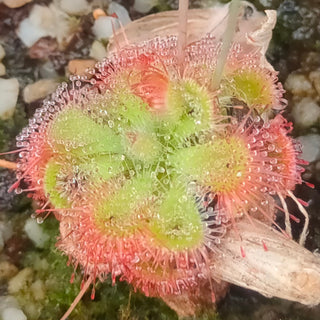Camassia quamash
WILD NATIVE QUAMASH CAMAS
- Unit price
- / per
Camassia quamash, commonly known as camas, small camas, or quamash, is native to western North America in large areas of southern Canada and the northwestern United States.
The pale blue to deep blue flowers appear in late spring to early summer (May to June in their native habitat).
Though the once-immense spreads of camas lands have diminished because of modern developments and agriculture, numerous camas prairies and marshes may still be seen today.
This bulbflower naturalizes well in gardens. The bulb grows best in well-drained soil high in humus. It will grow in lightly shaded forest areas and on rocky outcrops as well as in open meadows or prairies. Additionally, it is found growing alongside streams and rivers. The plants may be divided in autumn after the leaves have withered. Additionally, the plant spreads by seed rather than by runners. Deer resistant.
Type: Hardy perennial
Hardiness zones: 4-7
Height: 60cm, 24"
Location: Sun
Seeds per packet: 10
Sow just under the surface of the soil and water in. Leave them at room temperature for 6 weeks. This helps break the phytohormones which inhibit germination. They will not grow yet. Then a cooling period is required. Cover them with plastic and place in a fridge for 80 days. Be sure they stay moist. After the cold stratification period they are then brought back to a cool room (15-18C, 59-68F) for them to germinate. Germination can be erratic, generally 30-90 days after the warming period for most seeds, though some can take longer.
Ornamental use only. These seed and/or plants are poisonous.
Camassia quamash
WILD NATIVE QUAMASH CAMAS
- Unit price
- / per
Multiple secure payment options available.
Adding product to your cart
You may also like
Camassia quamash, commonly known as camas, small camas, or quamash, is native to western North America in large areas of southern Canada and the northwestern United States.
The pale blue to deep blue flowers appear in late spring to early summer (May to June in their native habitat).
Though the once-immense spreads of camas lands have diminished because of modern developments and agriculture, numerous camas prairies and marshes may still be seen today.
This bulbflower naturalizes well in gardens. The bulb grows best in well-drained soil high in humus. It will grow in lightly shaded forest areas and on rocky outcrops as well as in open meadows or prairies. Additionally, it is found growing alongside streams and rivers. The plants may be divided in autumn after the leaves have withered. Additionally, the plant spreads by seed rather than by runners. Deer resistant.
Type: Hardy perennial
Hardiness zones: 4-7
Height: 60cm, 24"
Location: Sun
Seeds per packet: 10
Sow just under the surface of the soil and water in. Leave them at room temperature for 6 weeks. This helps break the phytohormones which inhibit germination. They will not grow yet. Then a cooling period is required. Cover them with plastic and place in a fridge for 80 days. Be sure they stay moist. After the cold stratification period they are then brought back to a cool room (15-18C, 59-68F) for them to germinate. Germination can be erratic, generally 30-90 days after the warming period for most seeds, though some can take longer.
Ornamental use only. These seed and/or plants are poisonous.













































